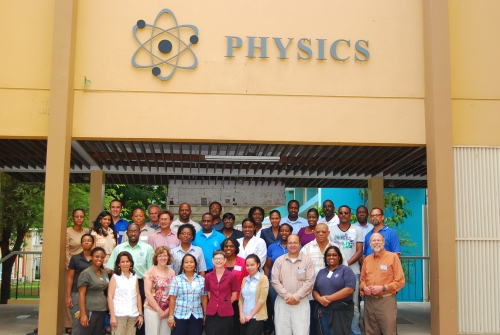By Teddy Allen, IEDRO Science Applications Manager
May 7-10, 2012 –The University of the West Indies, Mona, Kingston, Jamaica.
IEDRO recently participated in the Capacity Building Workshop on Data Rescue and Climate Change Indices as part of the Expert Team on Climate Change Detection and Indices (ETCCDI). The remaining ETCCDI members supporting the workshop represented NOAA, The Caribbean Institute for Meteorology and Hydrology, The University of The West Indies, and Environment Canada. Together the ETCCDI members introduced and taught software packages for data homogenization (RHtestsV3) and indices calculation (RClimDex) to a host of visiting national meteorological service representatives from most of the Caribbean islands.

The participants at the University of the West Indies, Mona, Kingston, Jamaica. Photo by Teddy Allen.
Each island’s representative brought data files consisting of daily rainfall and temperature observations with them to the conference. These files were quality controlled using RClimDex to highlight any outliers due to possible errors in data entry and were then checked for homogenization using RHtestsV3. Both software packages use a convenient and intuitive graphical user interface with zero programming demands from the user. The RHtestsV3 software package can be used to detect, and adjust for, multiple change points (shifts) that could exist in a data series that may have first order autoregressive errors. Many of these errors result from changes in station observation location or due to the development of the surrounding areas that may influence the instrumentation recordings. Examples of these errors show significant or steep changes in data trends over a short time step within a time series. When examining historical data records, it is crucial to analyze a time series that has not been affected by changes in instrument location or local development, which could produce non-homogeneous records with trends that are not climate related.
Once the data files were quality controlled, the time series data was imputed into RClimDex to produce a suite of 24 climate indices including information regarding trends in total precipitation, the amount of consecutive dry spells, and temperature. The conclusion of the workshop resulted in the exchange of each of these indices among the meteorological station representatives which will be integrated into the global framework for the upcoming IPCC report.
The addition of historical records to any time series will ultimately improve the ability to produce more accurate statistical analysis including recognition of extreme events and climate trends. Emphasis on data rescue was a primary focus throughout the workshop, in order to encourage the data rescue and digitization process so that each station’s time series could eventually be elongated and contribute to more accurate analysis.
The overall themes of data rescue, quality control, and indices calculation were very well received and understood by all of the participants resulting in a positive experience both professionally and personally.
More information on the software along with download instructions and examples can be found here:

Comments are closed.